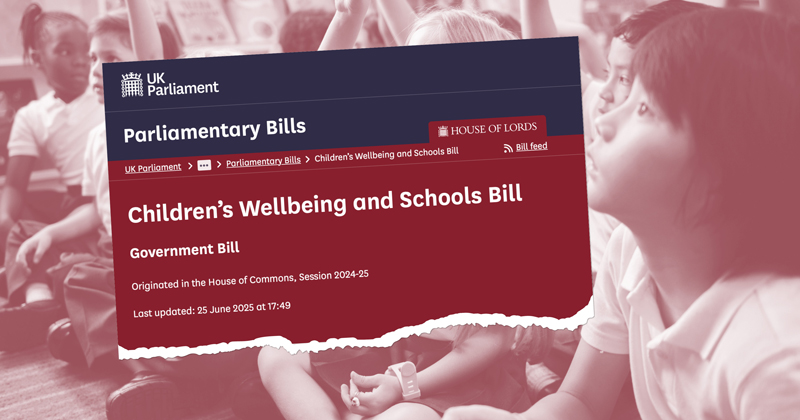Labour’s schools bill reforms which propose rolling back academy freedoms have been heavily criticised by many, including high-profile trust bosses and former ministers.
The issue has dominated national newspaper coverage and parliamentary committees. But who are the trust leaders fighting for the government’s reforms?
We asked the Department for Education for the names of CEOs who supported their bill and would be happy to talk about it. They provided us with six names. We also tracked down some others. Here’s what they had to say …
Academy freedom changes ‘prevent race to bottom’
Labour’s wellbeing and schools bill is one of two halves. The first, covering safeguarding and social care, is widely welcomed.
But the other half – which focuses on the schools system and rolling back academy freedoms – has caused the government no end of grief.
After a concession on pay, trusts will now have to follow a national pay “floor, but no ceiling”. But freedoms over curriculum and employing unqualified teachers will be revoked.
Some CEOs have said this will stifle innovation. But Exceed Learning Partnership CEO Beryce Nixon said critics “don’t represent all the voices in the system”.
She suggested that some may opt to have a “narrower curriculum so their assessment models show they’re high performing in terms of outcomes”.

Sir Paul Tarn, of Delta Academies Trust, added: “What if you’ve got the next Lennon and McCartney going to a school that doesn’t have any music?”
And E-ACT chief Tom Campbell stressed that the changes do not “prevent innovation or excellence… [they prevent] a race to the bottom”.
Campbell said the change to pay also establishes “minimum standards [and] protects the profession”. He added: “We’re seeing a recruitment crisis partly because some academies have eroded terms and conditions.
“Setting a floor doesn’t prevent us going above it, and it helps create a more sustainable workforce across the system.”
Could Labour go further on pay?
A poll conducted by Edurio for Schools Week showed that almost 70 per cent of chief executives think the implementation of the national curriculum in all academies will have no impact on their work.
Almost 80 per cent gave the same answer when asked about plans to make academies follow a pay “floor, but no ceiling”.
Star Academies chief executive Sir Hamid Patel, another name provided by the government as someone in favour of its reforms, stated: “Many trusts already exceed these expectations, and the majority follow national frameworks while continuing to innovate – particularly in response to the current recruitment challenges.”
Some also want Labour to go further. Nixon, whose trust consists of 10 schools in Doncaster, said no pay ceiling leaves trusts like hers in a “challenging position” as others with “lots of different income-generation arms”, like teaching schools, will be able to offer higher wages.

“Because I’m serving the most challenging areas across the country, I’m looking at that resource deployment and want that to go straight back into the children,” Nixon said.
“I don’t then want to be feeling I’ve got to be paying more money for roles because I’m just competing with somebody down the road.”
Tarn also called for “recruitment allowances” and “finders’ fees” to be stamped out of the profession. Getting into “a bidding war” to take “a teacher from one classroom and put them into another” is a “nil-sum game” and “not a sensible use of public money”.
Schools in cold for ‘too long’
The bill says schools rated ‘inadequate’ won’t automatically be handed an academy order. This will now be at the education secretary’s discretion, with support offered through RISE improvement teams in cases where academisation “isn’t necessary”.
Last month, former academies minister Lord Agnew warned that “ambiguity” over academisation for failing schools will “present a get-out-of-jail card for the incompetent management of those schools”.
Others have said it will lead to more judicial reviews over academisation cases.
But Lift Schools CEO Becks Boomer-Clark said: “Structures don’t raise standards – people do. Strong schools, working together in strong partnerships, will continue to make the difference.”

And many of the bill’s supporters argue that the current system already leaves some in the cold. Nixon noted that “nobody’s been wanting schools in financial deficit”, meaning some have been left “without a trust for too long”.
Schools Week analysis from January showed the 310 sponsored academies which opened since 2022 waited just over 18 months on average to convert after an ‘inadequate’ rating – way longer than the government’s six-month target. Two were waiting for more than five years.
LA improvers ‘locked out’
Jonny Uttley, of 12-school MAT The Education Alliance, said having a “more flexible model” gives the “opportunity to get more timely support in” through new RISE teams, without the costly rebroker process, which straight away includes £150,000 in sponsor fees.
It also “locked out a lot of talented people from school improvement”, particularly those in council-run primaries and secondaries, Uttley added.
Vanessa Ogden, of the Mulberry Schools Trust, said the “sense of the bill is to ensure [schools go to] the best provider”, rather than “ruling out a local authority just because it’s a local authority”.
And Patel said he was “heartened by the government’s clear expectation that academisation will remain the route for the majority of underperforming schools”.
He added: “Discretion allows for more tailored decisions, but it doesn’t dilute the central role of academies in raising standards.”
The growing role of LAs, mainly over admissions
In the Edurio survey, 39 per cent of polled CEOs said the proposed duty that all new teachers have qualified teacher status would negatively impact them – the highest proportion of the four academy reform policies included in the survey.
Currently academies can employ unqualified teachers. However, the bill makes clear this requirement will only apply to new teachers, not those already in the profession.
Seamus Murphy, chief executive of Turner Schools, said the policy was “sensible”.
He added: “We want really expert teachers. Having untrained people joining the system is reliant on individual institutions that they have quality [to train them up] – and I worry about that. The market has not been successful in education in many areas.”

Despite many leaders saying that the reforms would make no difference to their provision, few said they would actually deliver a “positive impact”.
But Uttley said the bill was trying to “rationalise a very fragmented system” and tackle “some of the more egregious things that had gone on” around some trusts’ admissions.
Another bone of contention for some is councils getting more powers on admissions over academies – including a new duty for both to collaborate, and for councils to direct an academy to admit a child.
“When you look across the system, there are real disparities between the proportion of children with EHCPs in different schools and the proportion of local children who actually attend those schools,” Uttley said. “That has a negative impact on the system.”
Murphy added that the admission and safeguarding changes will “tighten some of the gaps in the system. It will definitely improve the way people operate and keep everybody honest.
“The schools bill isn’t a call to arms piece, but maybe this isn’t a call to arm government?
“If you talk to staff, would they even be able to tell you if there was a schools bill? It seems to have attracted a certain type of anti-Labour contingent who enormously benefited from the previous administration.”
Critics ‘protecting legacies’
Uttley said the “tone” of criticisms was “out of kilter with what is actually a very measured and moderate bill”. He accused some former ministers attacking the legislation of attempting to protect “their political legacy”.
Campbell claimed this also stemmed from “a fundamental misunderstanding of what good academy leadership looks like”.
The “strongest” MATs “operate with high transparency, collaborative approaches and commitment to serving their communities”.
Boomer-Clark added: “Let’s be clear: the children’s wellbeing and schools bill is not going to upend the education system.
“The idea that it will ‘set us back years’ is not only wrong, it’s unhelpful.”
Many leaders have questioned why Labour has pushed forward its legislation agenda before publishing a white paper setting out its vision, but the latter is due in the autumn.
However, Murphy added: “Our current school system is beneficial for schools and leaders, but less so for children. This legislation is going some way to challenge that, but we need to see that vision in technicolour now.”

















Your thoughts